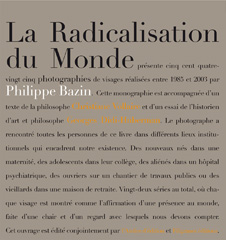For over twenty years, Philippe Bazin photograph the face of individuals caught in an institutional context (the hospital, hospice, schools, prisons …). The whole of this vast art project on the faces of our contemporaries questioned the presence of man in the institutions that frame our lives from birth to death, as Michel Foucault was able to speak in his work, but poses also the question of singularity. It is through photography, to give face to those who missed our eyes, have often lost sight of a collective. Each face is shown as a statement of the presence in the world, made of flesh and a light with which we rely. Photographs of P. Bazin avoid psychologism any pathos, and do not seek to uncover an alleged interiority, they are not a social but attempting to empty any presence outside oneself.
We can consider that Bazin makes a kind of collective memory from some fringes of our society.
We can consider that Bazin makes a kind of collective memory from some fringes of our society.
Coproducer
L'atelier d'édition
Released
17/07/2009
Collection
Hors Collection
Format
290 x 290
Relié couverture cartonnée
600 duo tone and color photos
280 pages
ISBN : 978-2-35046-181-6
Press review
- 04/05/2010 La radicalisation du monde par François Lecocq (Let's Motiv)
- 15/03/2010 La Radicalisation du monde par Luc Desbenoit (Télérama)
- 15/12/2009 La radicalisation du monde par Magali Jauffret (l'Humanité)
- 10/12/2009 La radicalisation du monde par Brigitte Ollier (Libération)
- 13/11/2009 La radicalisation du monde par Louis Mesplé (Rue 89)
- 23/10/2009 La radicalisation du monde par François Aubart (Critique d'art)
- 21/10/2009 La radicalisation du monde dans Purpose (Purpose)
- 09/10/2009 La radicalisation du monde par André Rouillé (ParisArt.com)
Philippe Bazin was born in 1954 in Nantes. Lives and works in Paris. Laureate Nièpce (2000). Physician training is during his visits that the rapprochement with the patient’s face frozen by auscultation with a stethoscope was imposed on him as present and as an image. The framing of this proximity to the face and the face of increased use of the flash ring produces this effect radical presence, auscultation dazzled the privacy of others.
Philosophe et historien de l’art français né à Saint-Étienne en 1953. A été pensionnaire à la Villa Médicis à Rome. Enseigne à l’École des hautes études en sciences sociales où il est maître de conférences.
Christiane Vollaire est philosophe. Ex-infirmière, elle enseigne la philosophie à Dunkerque.
